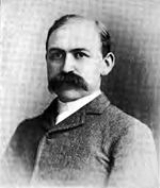
William Bullock Clark
Encyclopedia
- For other people named William Clark, see William Clark (disambiguation)William Clark (disambiguation)-Politics:* William Clark , American soldier and explorer; governor of Missouri Territory* William Clark , American politician, US Congressman from Pennsylvania, and Treasurer of the United States...
- For the Lewis and Clark Expedition, see Lewis and Clark ExpeditionLewis and Clark ExpeditionThe Lewis and Clark Expedition, or ″Corps of Discovery Expedition" was the first transcontinental expedition to the Pacific Coast by the United States. Commissioned by President Thomas Jefferson and led by two Virginia-born veterans of Indian wars in the Ohio Valley, Meriwether Lewis and William...
William Bullock Clark, Ph. D., LL.D (December 15, 1860 – July 27, 1917), was an American
United States
The United States of America is a federal constitutional republic comprising fifty states and a federal district...
geologist
Geologist
A geologist is a scientist who studies the solid and liquid matter that constitutes the Earth as well as the processes and history that has shaped it. Geologists usually engage in studying geology. Geologists, studying more of an applied science than a theoretical one, must approach Geology using...
.
He was born at Brattleboro, Vermont
Brattleboro, Vermont
Brattleboro, originally Brattleborough, is a town in Windham County, Vermont, United States, located in the southeast corner of the state, along the state line with New Hampshire. The population was 12,046 at the 2010 census...
, and educated at Amherst College
Amherst College
Amherst College is a private liberal arts college located in Amherst, Massachusetts, United States. Amherst is an exclusively undergraduate four-year institution and enrolled 1,744 students in the fall of 2009...
and in Munich. In 1888 he became connected with the United States Geological Survey
United States Geological Survey
The United States Geological Survey is a scientific agency of the United States government. The scientists of the USGS study the landscape of the United States, its natural resources, and the natural hazards that threaten it. The organization has four major science disciplines, concerning biology,...
.
William Bullock Clark was a professor of geology
Geology
Geology is the science comprising the study of solid Earth, the rocks of which it is composed, and the processes by which it evolves. Geology gives insight into the history of the Earth, as it provides the primary evidence for plate tectonics, the evolutionary history of life, and past climates...
at Johns Hopkins University
Johns Hopkins University
The Johns Hopkins University, commonly referred to as Johns Hopkins, JHU, or simply Hopkins, is a private research university based in Baltimore, Maryland, United States...
(1887–1917) who led the department through a period of great growth, during which it awarded forty-six PhDs, twice as many as any other university. One of these was the first PhD in meteorology ever earned in the United States awarded to Oliver Lanard Fassig
Oliver Lanard Fassig
Oliver Lanard Fassig was an American meteorologist and climatologist who worked for the United States Weather Bureau initially as part of the Signal Corps of the United States War Department and later affiliated with the United States Department of Agriculture.Oliver Lanard Fassig was born at...
. In addition to this, Clark founded and directed both the Maryland State Weather Service and the Maryland Geological Survey, as well as serving as the State's representative when the Mason-Dixon line
Mason-Dixon line
The Mason–Dixon Line was surveyed between 1763 and 1767 by Charles Mason and Jeremiah Dixon in the resolution of a border dispute between British colonies in Colonial America. It forms a demarcation line among four U.S. states, forming part of the borders of Pennsylvania, Maryland, Delaware, and...
was resurveyed in 1900.
For his work at the Johns Hopkins University
Johns Hopkins University
The Johns Hopkins University, commonly referred to as Johns Hopkins, JHU, or simply Hopkins, is a private research university based in Baltimore, Maryland, United States...
, one of the dormitories in the Alumni Memorial Residences ("AMRs") has been named after him. The building Clark Hall (also at The Johns Hopkins University), however, is not named after him (Clark Hall is named after donor A. James Clark).
Clark died in 1917 from a stroke at the age of 57.

